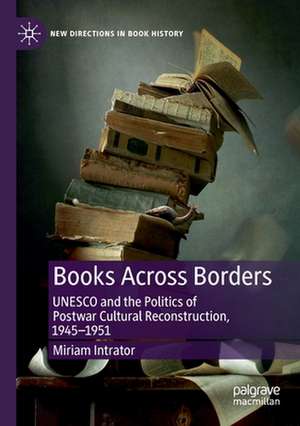Books Across Borders: UNESCO and the Politics of Postwar Cultural Reconstruction, 1945–1951: New Directions in Book History
Autor Miriam Intratoren Limba Engleză Paperback – 14 aug 2020
| Toate formatele și edițiile | Preț | Express |
|---|---|---|
| Paperback (1) | 525.35 lei 43-57 zile | |
| Springer International Publishing – 14 aug 2020 | 525.35 lei 43-57 zile | |
| Hardback (1) | 530.75 lei 43-57 zile | |
| Springer International Publishing – 3 iul 2019 | 530.75 lei 43-57 zile |
Din seria New Directions in Book History
- 17%
 Preț: 393.55 lei
Preț: 393.55 lei - 20%
 Preț: 689.08 lei
Preț: 689.08 lei - 18%
 Preț: 950.21 lei
Preț: 950.21 lei - 20%
 Preț: 691.41 lei
Preț: 691.41 lei - 15%
 Preț: 697.47 lei
Preț: 697.47 lei - 15%
 Preț: 525.54 lei
Preț: 525.54 lei -
 Preț: 384.86 lei
Preț: 384.86 lei - 18%
 Preț: 786.18 lei
Preț: 786.18 lei - 15%
 Preț: 581.79 lei
Preț: 581.79 lei - 18%
 Preț: 891.17 lei
Preț: 891.17 lei -
 Preț: 431.94 lei
Preț: 431.94 lei - 15%
 Preț: 587.53 lei
Preț: 587.53 lei - 18%
 Preț: 729.23 lei
Preț: 729.23 lei - 15%
 Preț: 524.22 lei
Preț: 524.22 lei - 18%
 Preț: 737.89 lei
Preț: 737.89 lei -
 Preț: 381.98 lei
Preț: 381.98 lei - 18%
 Preț: 724.50 lei
Preț: 724.50 lei - 15%
 Preț: 640.55 lei
Preț: 640.55 lei - 18%
 Preț: 779.57 lei
Preț: 779.57 lei - 15%
 Preț: 582.30 lei
Preț: 582.30 lei -
 Preț: 452.25 lei
Preț: 452.25 lei - 15%
 Preț: 587.20 lei
Preț: 587.20 lei - 18%
 Preț: 785.11 lei
Preț: 785.11 lei - 20%
 Preț: 525.35 lei
Preț: 525.35 lei - 15%
 Preț: 637.78 lei
Preț: 637.78 lei - 18%
 Preț: 785.55 lei
Preț: 785.55 lei - 18%
 Preț: 789.52 lei
Preț: 789.52 lei - 18%
 Preț: 947.50 lei
Preț: 947.50 lei - 18%
 Preț: 779.08 lei
Preț: 779.08 lei -
 Preț: 221.43 lei
Preț: 221.43 lei - 15%
 Preț: 643.16 lei
Preț: 643.16 lei -
 Preț: 419.81 lei
Preț: 419.81 lei - 15%
 Preț: 697.32 lei
Preț: 697.32 lei -
 Preț: 384.86 lei
Preț: 384.86 lei
Preț: 525.35 lei
Preț vechi: 618.05 lei
-15% Nou
Puncte Express: 788
Preț estimativ în valută:
100.56€ • 109.26$ • 84.52£
100.56€ • 109.26$ • 84.52£
Carte tipărită la comandă
Livrare economică 21 aprilie-05 mai
Preluare comenzi: 021 569.72.76
Specificații
ISBN-13: 9783030158187
ISBN-10: 3030158187
Pagini: 280
Ilustrații: XV, 280 p. 8 illus.
Dimensiuni: 148 x 210 mm
Greutate: 0.36 kg
Ediția:1st ed. 2019
Editura: Springer International Publishing
Colecția Palgrave Macmillan
Seria New Directions in Book History
Locul publicării:Cham, Switzerland
ISBN-10: 3030158187
Pagini: 280
Ilustrații: XV, 280 p. 8 illus.
Dimensiuni: 148 x 210 mm
Greutate: 0.36 kg
Ediția:1st ed. 2019
Editura: Springer International Publishing
Colecția Palgrave Macmillan
Seria New Directions in Book History
Locul publicării:Cham, Switzerland
Cuprins
Chapter One - Introduction: The UNESCO Libraries Section.- Chapter Two - Wartime Planning, Postwar Response.- Chapter Three - Books between Libraries: Sharing, Exchange, and Purchasing.- Chapter Four - Books across Borders: Translation and Cheap Books.- Chapter Five - The Contested Fate of Confiscated Books and Objectionable Literature.- Chapter Six - Non-Restitutable Books and The Library That Never Was.- Chapter Seven - Access to Books, Libraries, and Information: Cultural Right, Human Right.- Chapter Eight - Conclusion: From the Postwar to Today.
Recenzii
“It is well written and tells a complex tale in a clear and careful way. ... While librarians and book historians will find this book of great interest, it also deserves a broader audience. Intrator’s study is invaluable for those who are interested in the history of global organizations such as UNESCO and its role in shaping understandings of culture after the Second World War, as well as its successes and failures on the ground.” (Amanda Laugesen, Libraries- Culture, History, and Society, Vol. 5 (1), 2021)
Notă biografică
Miriam Intrator is Special Collections Librarian responsible for rare books at Ohio University, USA. She received her PhD in Modern European History from the Graduate Center, City University of New York, USA, in 2013, and received the 2015 Phyllis Dain Library History Dissertation Award.
Textul de pe ultima copertă
Books Across Borders: UNESCO and the Politics of Postwar Cultural Reconstruction, 1945-1951 is a history of the emotional, ideological, informational, and technical power and meaning of books and libraries in the aftermath of World War II, examined through the cultural reconstruction activities undertaken by the Libraries Section of the United Nations Educational, Scientific and Cultural Organization (UNESCO). The book focuses on the key actors and on-the-ground work of the Libraries Section in four central areas: empowering libraries around the world to acquire the books they wanted and needed; facilitating expanded global production of quality translations and affordable books; participating in debates over the contested fate of confiscated books and displaced libraries; and formulating notions of cultural rights as human rights. Through examples from France, Poland, and surviving Jewish Europe, this book provides new insight into the complexities and specificities of UNESCO’s role in the realm of books, libraries, and networks of information exchange during the early postwar, post-Holocaust, Cold War years.
Caracteristici
Highlights the history of the postwar reconstruction of libraries via UNESCO Provides insight into the impact of WWII on access to books, translations, and libraries Frames the shaping of the idea of cultural rights
